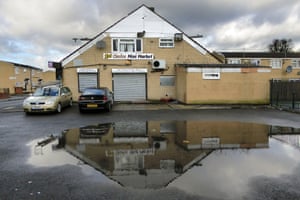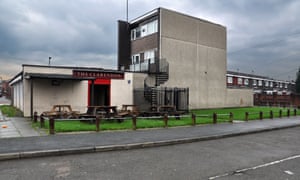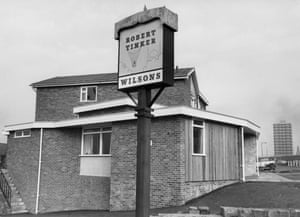'Never drink in a flat-roofed pub': how the old joke became a reality | Cities
English postwar estate bars are often seen as a joke: “Never drink in a flat-roofed pub,†the saying goes. But these pubs â€" whether they’re 1930s-style redbrick structures with pitched roofs and large beer gardens, or forbidding cubes of wood and brick that squat in the shadow of tower blocks â€" are now at risk. They’re being closed and converted into shops or apartments, boarded up and left to rot, or completely wiped from the map, leaving a cleared site and an empty car park.
“There’s a huge level of threat: these pubs are dropping like flies,†says Emily Cole of Historic England.
In Greater Manchester, pub closure has been hastened by the city’s regeneration. “The breweries have no interest†in the pubs, says photographer Stephen Marland, who has been documenting their demise. “The community does, but very often the local authority wants the land eventually. So they’ll gladly let them die away.â€
In the past, the pub acted as “the community anchorâ€, says Martin Dodge, a senior lecturer in geography at the University of Manchester. Now there’s nostalgia for the English pub, “but that’s not going to pay the rent. If you don’t go and buy your beer there, it’s not going to survive.â€
Remnants of another Manchester
On a visit to Manchester a few months ago, I passed a boarded-up building not far from Oxford Road. Its first floor was painted grey and its roof pitched steeply into a sharp peak. An old CCTV camera pointed in the direction of the door. This was the Gamecock, an old estate pub which, judging by its overgrown car park, had been closed for some time. Surrounded by sleek university buildings and refurbished flats, it seemed a strange and intriguing remnant of another Manchester.

In his blog Manchester Estate Pubs, Marland photographs pubs just like the Gamecock. He thinks pubs “are almost a barometer of community and how a community is doing. If a pub’s doing well, then the community’s doing well.â€
But Marland is also drawn to them because they are under threat, and sees his work as an act of preservation. “Photographers are always photographing things that are on the way out, so it’s there as a record of something that no longer exists.
“[Estate pubs] are seemingly minor pieces of architecture … but they’re of great importance and should be treated that way.â€
He feels the demise of estate pubs is due to factors including changes in patterns of leisure activity, the rise of supermarkets as a source of cheap alcohol, and the increasing real estate value of their sites â€" it’s more economically viable to build apartments on a pub site than to keep it going as a business, or even a community resource. He believes councils in Greater Manchester are buying up pub sites for future redevelopment, leaving “whole deserts of publessness†in certain neighbourhoods.

Marland started his blog in 2015 after Historic England called for contributions to their project on postwar pubs. Cole, the senior investigator on the project, says: “One of the reasons our project was initiated was because we’ve been finding that pubs of the 60s and 70s, but also the 50s, are the ones that tend to be demolished around the country.â€
She feels they’re neglected partly because people don’t tend to appreciate modern architecture in the same way they would an older pub. “So I think they’ve come to be seen as characterless buildings, particularly in terms of their interiors. But actually what we’ve been finding is that when they were built and opened they were actually far from characterless. They were very exciting in many cases.â€
The rise of the estate pub in Manchester is closely entwined with the expansion of the city in the 20th century. This partly came from the slum clearances in the city centre when significant numbers of people were moved to housing estates on Manchester’s outskirts. Dodge says that when the inner-city neighbourhoods were bulldozed, “the places that survived were the church and the pub. They were these isolated survivors and then this [logic] carried over into overspill estates. So the pub and the church get carried across from these old communities into new communities.â€
‘A necessary thing’
“What are you, a tourist who takes photos of pubs?†asks a local drinking on the front lawn of the Happy Man pub when I take a photograph.
It’s a sunny afternoon in Wythenshawe, south Manchester, the day after the terrorist attack in Manchester Arena, and, while large parts of the central city are cordoned off by the police, there’s a relaxed, mellow feeling at the Happy Man.

Wythenshawe was initially planned in the 1920s as a garden city development that would accommodate a growing population and those moved from the inner cities. “The ethos of Wythenshawe was not just to rehouse people, but to try and change the social conditions to remake people. And the pub was seen as a necessary thing,†Dodge says. A map drawn up by the Manchester Corporation in the 1950s shows existing and proposed pubs for Wythenshawe: 45 of them. Each site was reserved for a different brewery who would design, build and run the public house.
“Breweries had their own architectural teams, and also commissioned [external] architects, and they had a great feeling for how a pub should be designed,†Cole says. “They made them very particular to their environment.â€
In Wythenshawe, for example, they’d be built in redbrick, and styled to fit in with the housing. And from the late 60s on, pubs began to echo the design of brutalist estates and high-rises, and were often slotted together from the same concrete as the modern housing that surrounded them.
A couple of minutes up the road from the busy Happy Man, another pub, the Mountain Ash, looks empty.

The landlord, Roy Heer, opens the side gate. From the street, the pub closely resembles blueprints I had seen from Manchester’s city archives, but from the rear it’s obvious that it has expanded significantly over the years. Heer says they have stopped opening during the day on weekdays, and instead open at 6pm. Margins are tight, but he has planning permission to put bed and breakfast rooms on the first floor.
There are signs of construction on the roof of the pub’s extension â€" plywood walls, uPVC windows and tarpaulin. It had originally been owned by Wilsons’ brewery, but has since been taken over by a Chinese firm. Although the Mountain Ash had been one of many pubs Manchester Corporation painstakingly placed in postwar Wythenshawe, Heer felt the council were now letting the pubs in the area run down.
“I gave up a good job to work here,†he says.
The best pub in Salford?
On the other side of Manchester, situated between a busy dual carriageway and a quiet two-lane suburban road in the Pendleton district of Salford, is the run-down Woolpack pub.
It was assembled on site from prefabricated sections made in a factory in St Helens, opening in 1970 to serve the high-rise flats that surround it. The interior referenced the wool trade: pictures of ships hung on the wall, while the bar was constructed to resemble stacked bales of wool. Although the decor pointed to the past, the new Woolpack was a pub for a different time and a changing place.
The Woolpack has been closed for nine years, its owners having passed over the course of its life between breweries, pub companies and multinational corporations through a dizzying succession of acquisitions and mergers that led to the pub being put up for sale in 2008 â€" in part thanks to the financial crisis of that year.

When it closed, members of the locality campaigned to reopen it as a community pub, but these efforts failed, and in 2009 Salford city council acquired the building and its grounds. The council has acquired other pubs in a similar way, often knocking them down, sometimes clearing the sites for housing. Stephen Kingston, the editor of Salford Star magazine, thinks “the Woolpack will probably go that way tooâ€.
Local resident Gene Houghton told Marland’s blog: “It was, and will always remain, the best pub in Salford. “When these doors closed last year a community closed with it. People came from near and far, everyone knew each other and it was a pleasure to go to.â€
For now, there’s still life in the Woolpack. In 2016, Bez from the Happy Mondays occupied the pub’s grounds to plant apple trees. When he ran for election in the Salford and Eccles constituency in the 2015 general election, one of his campaign promises had been free food for the people of Salford. “I was trying to say if we act as a community, there’s no need for us to go hungry,†he tells me. “Apples are an amazing fruit, because it’s food, it’s medicine. It’s everything, do you know what I mean? You can get pissed with it â€" you can make amazing cider out of it.â€
A few months after Bez planted the apple trees, a local homeless charity for which he’s a patron, Coffee4Craig, was granted a 25-year lease on the site by Salford city council. They plan to adapt the pub building for homeless services, or to clear the site and rebuild. But for the moment they keep a green shipping container in the car park and the building remains closed. “Hopefully the pub is going to get rebuilt and used for community things and helping with the homeless situation,†he says.
In the meantime, an enterprising scrap merchant has placed small signs reading “Scrap Cars Wanted £100†on the first floor, while some of the roof’s wooden frame is exposed to the elements as the building decays.
I remember what Martin Dodge said about estate pubs built in the 60s and 70s: “Like the failures of the housing, the failures of the pub might be simply down to the quality of the construction â€" that actually the reason that they’ve become derelict and abandoned is that their lifespan simply ran out.â€
Was that true? The flats across the road had been refurbished, and the towers behind the Woolpack are now student housing; only the pub was shuttered and left to rot.
Follow Guardian Cities on Twitter and Facebook to join the discussion, and explore our archive here

0 Response to "'Never drink in a flat-roofed pub': how the old joke became a reality | Cities"
Posting Komentar